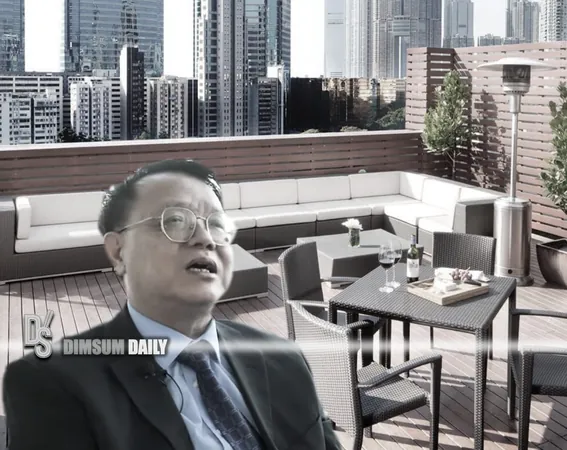
Hong Kong's Property Market Faces Drastic Downturn: Are Prices Set to Plummet by up to 75%?
2025-03-31
Author: Rajesh
March 31, 2025 – The Hong Kong property market is in a precarious position, teetering on the brink of a potential crash. Recent data from the Rating and Valuation Department reveals that the private residential price index saw a sharp decline of 0.87% in February, marking the lowest levels experienced in over eight years. Leading economist Dr. Yip Sau-leung from the Chinese University of Hong Kong has issued a stark warning: the market could be in line for a dramatic contraction, with property prices forecasted to tumble between 60% to 75% as the long-standing real estate bubble bursts.
In a bid to prevent a catastrophic scenario reminiscent of past negative equity crises, Dr. Yip stresses the necessity for financial stability among local banks. He advocates for the Hong Kong Monetary Authority to carry out rigorous stress tests on these institutions to ensure their resilience in the face of declining property values. Moreover, he underscores the urgency for the government to accelerate the development of "sandwich-class" housing—affordable living options strategically priced between public housing and private properties. This approach not only aims to improve residents' quality of life but also to alleviate fiscal shortfalls and foster social stability.
Currently, property values have already plummeted by approximately 30% to 40%, but Dr. Yip warns that a more destructive spiral could emerge, resulting in higher unemployment rates, a surge in business closures, and mass layoffs. As more individuals are forced to sell their homes at a loss, the risk to financial institutions grows significantly, drawing parallels to the devastating impacts seen in other markets affected by real estate collapses.
Dr. Yip elaborated on the historical context, stating that after a staggering 250% increase in property prices, a typical correction could reflect a decline of about 45% to 50%. However, current market conditions suggest that the actual drop might be even steeper, possibly reaching between 60% to 75%. The secondary market is already exhibiting aggressive price reductions, fueled by developers facing financial hardships who must lower prices to attract buyers.
With the economy on the downturn, Dr. Yip insists that a hard landing must be avoided at all costs and urges for concerted efforts to stabilize the banking sector. He also proposed that the government needs to provide thorough financial assessments to weigh the feasibility of the sandwich-class housing initiative, which could be pivotal for mitigating the effects of the predicted budget deficits. He cautioned against over-relying on land sales, as the unpredictable nature of property prices poses a significant risk to future government revenues.
Interestingly, Dr. Yip is optimistic about Hong Kong's potential to outstrip Singapore in housing quality, contingent on the successful implementation of the Sandwich Class Housing Scheme (SCHS). He noted that many citizens are likely to prefer investing in higher-quality sandwich-class homes, priced around HK$2.8 million, over the more basic public housing floor price of HK$1.8 million. The allure of improved living conditions and enhanced social standing positions these properties as an attractive alternative amid the turbulent market landscape.
As the market grapples with these challenges, one thing remains clear: the coming months will be critical in determining the trajectory of Hong Kong’s real estate market. Will bold initiatives and strategic planning avert disaster, or will the city face the full brunt of a market correction? Only time will tell.



 Brasil (PT)
Brasil (PT)
 Canada (EN)
Canada (EN)
 Chile (ES)
Chile (ES)
 Česko (CS)
Česko (CS)
 대한민국 (KO)
대한민국 (KO)
 España (ES)
España (ES)
 France (FR)
France (FR)
 Hong Kong (EN)
Hong Kong (EN)
 Italia (IT)
Italia (IT)
 日本 (JA)
日本 (JA)
 Magyarország (HU)
Magyarország (HU)
 Norge (NO)
Norge (NO)
 Polska (PL)
Polska (PL)
 Schweiz (DE)
Schweiz (DE)
 Singapore (EN)
Singapore (EN)
 Sverige (SV)
Sverige (SV)
 Suomi (FI)
Suomi (FI)
 Türkiye (TR)
Türkiye (TR)
 الإمارات العربية المتحدة (AR)
الإمارات العربية المتحدة (AR)